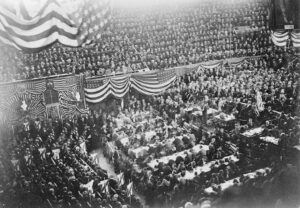Delegates and Superdelegates – What are They?
Delegates play a key role in nominating a presidential candidate.
By: Sarah Cowgill | February 13, 2020 | 470 Words

Democrat National Convention, 2016 (Photo by Jessica Kourkounis/Getty Images)
The road to becoming a nominee for president of the United States involves a small group of people known as delegates and superdelegates. The process of selecting delegates occurs in every state for both major political organizations, the Republican Party and the Democratic Party. This takes place during primaries and caucuses, which are events that involve selecting a candidate to compete in a presidential election.
A delegate system is intended to reflect the will of the people in each state and ensure that the right candidate is selected as the presidential nominee.
Made up of local party leaders and activists, delegates pledge to support the winner of their state contest at national conventions, which are held by both political parties during the summer before Election Day.
How Presidential Nominees are Chosen
Although the act of selecting delegates is similar for each party, the Democrats and Republicans apply their own methods to determine how delegates are pledged to cast a ballot at the convention.
The Democrats assign delegates to each potential nominee based on a percentage of the support the candidates receive in a state caucus or primary vote. For example, a state with 20 delegates can divvy up its delegates according to how many votes each candidate receives. In a three-way race, if candidate “A” received 70% of all caucus and primary votes, while candidate “B” got 20%, and candidate “C” obtained 10%, “A” would get 14 delegates, “B,” would get 4 delegates and “C” would be assigned two delegates.
Republicans give each state the right to award its delegates either by the percentage of votes method, or winner-take-all.
These delegates then cast their votes at the convention to select their party’s nominee.
Superdelegates

Republican National Convention, 1880 (Getty Images)
In theory, but rarely practiced, a superdelegate can alter the results of a nominating process. The superdelegate is pulled from a position of stature in the party, and may be major elected officials or distinguished party members.
The Democrats assign these superdelegates to ensure there is a safety net if they deem the candidate of the people may be ideologically unsuitable to be the nominee – according to party elite. Since the party lost the 2016 election, it has revamped the process. This involved stripping some power from the superdelegates, only allowing the delegates elected in primaries and caucuses to select the nominees. Superdelegates are now utilized in the event of a tie between candidates.
The Republican Party assigns three people from the Republican National Committee for every state. Republican superdelegates are bound to support the will of voters in their states.
Delegates then attend their national conventions and vote or pledge their support for the candidates still in the race. At the end of this process, a candidate is chosen from each party to run in the next presidential election.

















